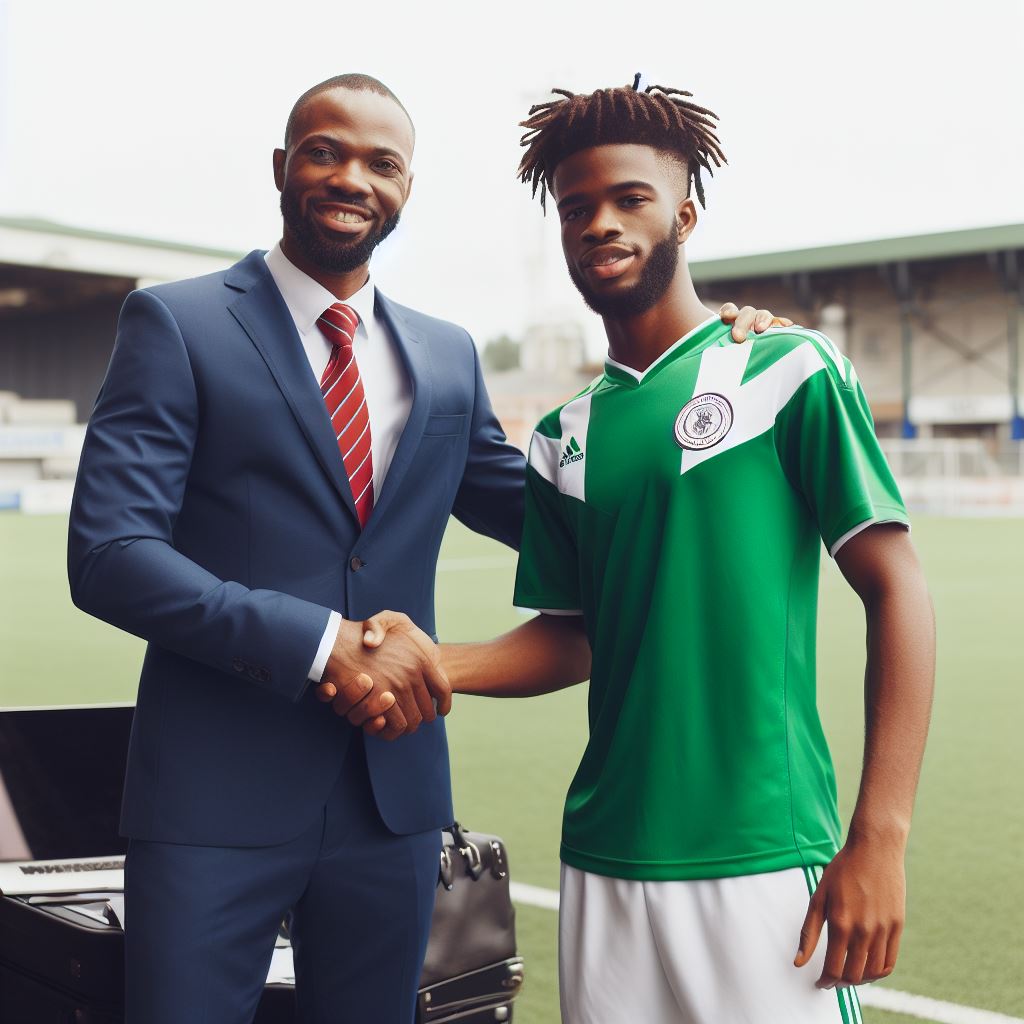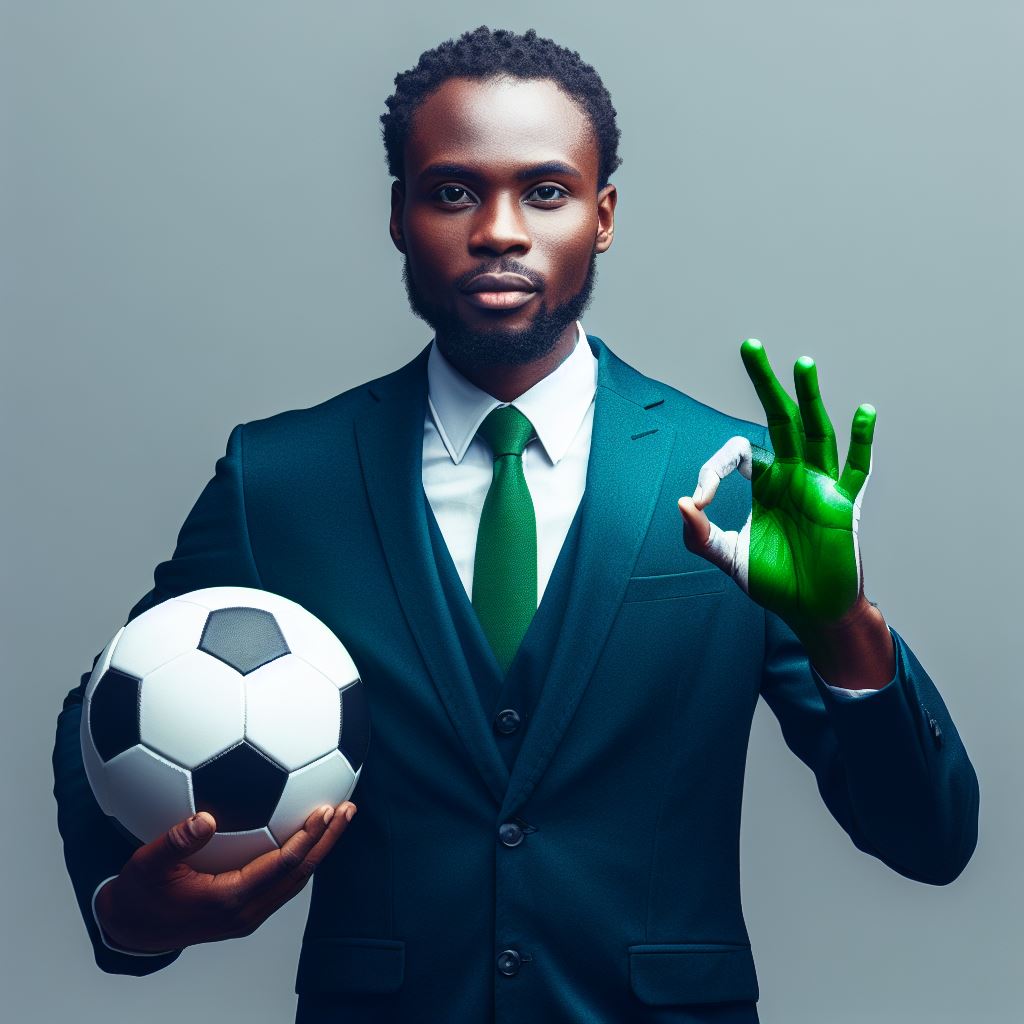Introduction
Let’s explore challenges faced by sports agents in Nigeria: An overview.
The challenges faced by sports agents in Nigeria are a significant topic of discussion.
Sports agents play a crucial role in the sports industry, representing and managing athletes.
In the dynamic and competitive world of sports management, Nigeria stands as a burgeoning hub of talent and potential.
With a rich tapestry of athletes spanning various disciplines, the nation holds promise for both aspiring and established sports agents.
However, within this promising landscape lies a myriad of challenges that these agents must grapple with on a daily basis.
This article delves into the intricate web of obstacles that sports agents face in Nigeria, shedding light on the complexities that shape their professional journeys.
From navigating regulatory hurdles to dealing with the ebbs and flows of the sports industry, this overview aims to provide a comprehensive understanding of the trials faced by sports agents in this vibrant African nation.
Understanding these challenges is vital as it allows us to appreciate the complexities of the sports agent profession.
By gaining insight into these challenges, aspiring agents and industry enthusiasts alike can better prepare themselves for the demands of this rewarding yet demanding profession.
Lack of Infrastructure
In Nigeria, sports agents face numerous challenges due to the lack of infrastructure in the country.
This inadequate sports infrastructure hinders the growth and development of sports agents, making it difficult for them to successfully operate in the industry.
Inadequate sports infrastructure in Nigeria
One major issue faced by sports agents in Nigeria is the limited availability of training facilities.
The scarcity of well-equipped training centers and sports academies makes it challenging for athletes to receive proper training and improve their skills.
This lack of training facilities greatly affects the overall development and performance of athletes, making it harder for sports agents to find talented individuals to represent.
Furthermore, the absence of modern stadiums and sports equipment also poses a significant challenge for sports agents.
Without proper venues to host sporting events, agents struggle to showcase their athletes’ abilities and attract potential sponsors or investors.
Additionally, the lack of access to quality sports equipment hampers the training and performance of athletes, further limiting their potential for success.
Impact of limited training facilities, stadiums, and sports equipment on sports agents
The impact of inadequate infrastructure extends beyond the day-to-day operations of sports agents.
It also detrimentally affects the representation and development of athletes in Nigeria.
With limited resources and facilities, sports agents find it difficult to provide the necessary support and guidance to their athletes.
This hinders the overall growth and progress of athletes, potentially preventing them from reaching their full potential.
How the lack of infrastructure affects the representation and development of athletes
Furthermore, the lack of infrastructure affects the visibility and exposure of athletes on both national and international platforms.
Without modern stadiums and training facilities, it becomes challenging to attract attention from professional teams, scouts, and sponsors.
This lack of exposure limits career opportunities for athletes and subsequently hampers the efforts of sports agents to secure favorable contracts and endorsements for their clients.
In short, the inadequate sports infrastructure in Nigeria poses significant challenges for sports agents.
The lack of training facilities, stadiums, and sports equipment severely impacts their ability to operate efficiently and find talented athletes to represent.
Additionally, the absence of infrastructure affects the representation and development of athletes, limiting their potential for success.
To overcome these challenges, it is crucial for stakeholders to invest in improving sports infrastructure in Nigeria, creating a conducive environment for both sports agents and athletes to thrive.
Read: Salary Insights: What Do Sports Agents Earn in Nigeria?
Financial Constraints
Financial challenges faced by sports agents in Nigeria
- Lack of sufficient funds to cover expenses for talent scouting and player management.
- Inability to compete with larger agencies that have more financial resources.
- Difficulty in attracting top talent due to the inability to offer competitive financial packages.
- High costs associated with marketing and promoting players in a crowded marketplace.
- Insufficient funds to provide necessary support services such as legal advice and contract negotiation.
Limited funding and sponsorship opportunities
- Lack of corporate sponsors willing to invest in sports agencies and player development programs.
- Inadequate government support in terms of funding and infrastructure development.
- Limited access to grants and loans for sports agents and agencies.
- High competition for available sponsorship opportunities, making it difficult to secure funding.
- Inequality in funding distribution, with a few agencies receiving the majority of financial support.
Impact of financial constraints on the growth of sports agencies and agent-client relationships
- Restricted ability to invest in talent development and player recruitment, limiting the agency’s growth potential.
- Difficulty in establishing long-term relationships with clients due to the inability to provide consistent financial support.
- Reduced ability to attract and retain top talent, leading to a decline in the agency’s reputation and credibility.
- Limited resources for marketing and promotion, hindering the agency’s ability to attract new clients and secure sponsorship deals.
- Increased pressure on agents to generate revenue, potentially compromising their ability to prioritize the best interests of their clients.
Read: Legal Requirements for Sports Agents in Nigeria: Know More
Limited Legal Framework
The absence or inadequacy of laws and regulations governing sports agents in Nigeria
Nigeria lacks specific laws and regulations that focus on the operations and practices of sports agents.
The absence of legal guidelines makes it challenging for agents to operate efficiently and ethically.
The lack of a clear legal framework leads to ambiguity and confusion in agent-athlete relationships.
The absence of laws means there are no licensing requirements or standard operating procedures for sports agents in Nigeria.
This lack of regulation opens doors for unqualified individuals to pose as agents and exploit athletes.
The implications of the lack of legal protection for agents and athletes
The absence of legal protection exposes both agents and athletes to various risks and vulnerabilities.
Agents face challenges in securing their rights, ensuring fair compensation, and establishing professional boundaries.
In the absence of legal protection, athletes are susceptible to exploitation and fraudulent practices.
Without regulations, agents cannot seek legal remedies for breach of contract or disputes with athletes.
The lack of legal protection hampers the growth and development of the sports industry in Nigeria.
The challenges faced in contract negotiations, representation rights, and dispute resolutions
The absence of a legal framework makes contract negotiations more complex and prone to misunderstandings.
Agents struggle to negotiate favorable terms and conditions on behalf of their athletes.
The absence of representation rights protection allows athletes to terminate contracts without consequences.
Dispute resolutions become challenging due to the absence of legal mechanisms and arbitral procedures for agents.
The lack of legal guidelines leads to prolonged and costly disputes between agents and athletes.
Read: Nigeria’s Top Sports Agents: Success Stories to Inspire

Corruption and Unethical Practices
The issue of corruption in the sports industry in Nigeria
Corruption is a significant challenge faced by sports agents in Nigeria.
Many individuals within the sports industry engage in corrupt practices for personal gain.
This includes taking bribes, manipulating player transfers, and influencing team selections.
Corruption creates an environment of unfairness and inequality within the sports sector.
It hampers the growth and development of sports agents and athletes in Nigeria.
Unethical practices and fraudulent behaviors prevalent among some agents
Unethical practices, such as misrepresentation and manipulation, are common among certain sports agents.
Some agents deceive athletes, promising them lucrative contracts and opportunities that do not materialize.
Fraudulent behaviors include embezzlement of funds meant for athletes’ welfare and unfair contract terms.
These unethical practices exploit vulnerable athletes who place their trust in sports agents.
Such behaviors tarnish the reputation of the entire sports agent profession.
How corruption and unethical practices affect the credibility and reputation of sports agents in Nigeria
Corruption and unethical practices erode the credibility and trust that athletes place in sports agents.
Athletes may become wary of seeking representation, fearing they will be taken advantage of.
This limits the pool of athletes available for sports agents, reducing their potential client base.
The reputation of sports agents in Nigeria suffers, affecting their ability to attract talented athletes.
Furthermore, the negative perception of corruption and unethical practices has a ripple effect on the entire sports industry.
In general, corruption and unethical practices pose significant challenges to sports agents in Nigeria.
The prevalence of corruption within the sports industry undermines fairness and equality.
Unethical behaviors, including fraudulent practices, exploit athletes and harm their trust in sports agents.
The credibility and reputation of sports agents are greatly affected, limiting their ability to attract talented athletes and grow their client base.
It is crucial for the sports industry in Nigeria to address these issues and establish ethical standards to ensure the credibility and success of sports agents.
Read: Becoming a Sports Agent in Nigeria: A Complete Guide
Complex Licensing and Registration Processes
Challenges related to licensing and registration of sports agents in Nigeria
- The lack of a streamlined and transparent licensing system poses a major challenge.
- High fees and financial requirements deter many aspiring sports agents from pursuing licensing.
- Obtaining the necessary documentation and fulfilling the requirements can be time-consuming and complicated.
- Strict eligibility criteria, such as educational qualifications and years of experience, limit access to licensing.
Lengthy and bureaucratic processes
- The applications for licensing and registration are often subject to significant delays and backlogs.
- Inefficient administrative processes and red tape make it difficult for sports agents to navigate the system.
- The involvement of multiple government agencies and authorities further prolongs the licensing process.
- Inconsistent enforcement of licensing regulations adds to the complexity and frustration for sports agents.
Impact on aspiring sports agents and the industry’s development
- The complex licensing processes create barriers to entry, limiting the number of qualified sports agents.
- Aspiring sports agents face substantial financial burdens due to high registration fees and requirements.
- The lengthy licensing procedures result in significant delays in starting their careers and representing athletes.
- The lack of transparency and efficiency hinders the growth and professionalism of the sports agent industry.
- This discourages potential investors and reduces the overall development potential of the sports industry.
- The limited number of licensed sports agents restricts opportunities for athletes to secure proper representation.
- Unlicensed agents may exploit athletes, leading to potential legal and contractual issues.
In review, the complex licensing and registration processes for sports agents in Nigeria pose significant challenges.
The lack of transparency, high fees, and bureaucratic procedures hinder the development of the industry and limit opportunities for aspiring sports agents.
Streamlining the licensing system, reducing financial barriers, and improving administrative efficiency would help promote professionalism and growth in the sports agent industry, benefiting both agents and athletes.
Limited Professional Development Opportunities
The lack of professional development programs specific to sports agents in Nigeria
Nigeria faces a significant challenge in terms of the limited opportunities for professional development programs tailored specifically to sports agents.
Unlike other countries where agencies have access to specialized training and certification, Nigeria lags behind in nurturing and supporting the growth of sports agents.
The absence of proper training, seminars, and workshops
An additional hurdle faced by sports agents in Nigeria is the absence of proper training, seminars, and workshops dedicated to enhancing their skills and knowledge in the field.
Without these platforms, agents struggle to stay updated with industry trends, legalities, negotiation strategies, and marketing techniques.
The importance of continuous learning and professional growth for sports agents
Continuous learning and professional growth are vital for sports agents in Nigeria.
As the sports industry becomes increasingly competitive and complex, agents must strive to stay ahead of the curve.
Professional development programs would provide them with essential tools and resources to evolve, thrive, and effectively represent their clients.
By addressing the limited professional development opportunities, Nigeria can bridge the gap between its sports agents and their international counterparts.
Implementing comprehensive programs that focus on agent-specific training and education would significantly elevate the standards of the profession.
Seminars and workshops conducted by industry experts would equip agents with the necessary skills relating to contract negotiation, talent scouting, sponsorship deals, and athlete representation.
These events would also provide a platform for agents to network, exchange ideas, and learn from each other’s experiences.
The establishment of professional certifications and licensing frameworks for sports agents in Nigeria should also be considered.
These frameworks can help regulate the industry and enhance the credibility and professionalism of sports agents in the country.
Furthermore, collaboration between sports agencies, sports governing bodies, universities, and government institutions can play a pivotal role in promoting professional development programs.
Through joint efforts, the industry can foster a culture of learning, growth, and innovation among sports agents in Nigeria.
In brief, the challenges faced by sports agents in Nigeria regarding limited professional development opportunities need to be addressed.
It is crucial to develop specific programs, conduct training sessions, seminars, and workshops, and emphasize the importance of continuous learning and professional growth.
By investing in the development of sports agents, Nigeria can elevate the standards of the profession and ensure its agents are well-equipped to navigate the competitive world of sports representation.
Conclusion
Limited resources, lack of infrastructure, and poor regulatory framework.
Improving agent effectiveness, attracting investment, and promoting athlete development.
Advocating for government support, strengthening sports management education, and establishing professional sports agent associations.
In summary, sports agents in Nigeria face significant challenges, including limited resources, lack of infrastructure, and a poor regulatory framework.
Addressing these challenges is crucial for the growth of the sports industry in the country.
By improving agent effectiveness, attracting investment, and promoting athlete development, the industry can thrive.
It is imperative for stakeholders to take action and support sports agents by advocating for government assistance, strengthening sports management education, and establishing professional sports agent associations.
Together, these efforts will contribute to the advancement of the sports industry in Nigeria.




